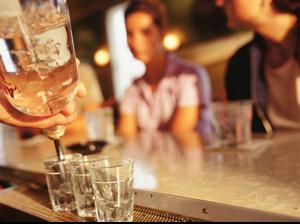I was at a bar, enjoying and returning the flirtatious attentions of a cute, drunk, bright-eyed guy. We’d been through all the stages: across-the-room glances, shy hellos and an “Oh look, we now happen to be standing next to each other” pas de deux that would make any dancer jealous. We had initiated physical contact, maintained lingering physical contact, progressed to audacious physical contact, and awkwardly but sweetly held hands for 15 minutes.
It was, as they say, a slam dunk. A home run. A touchdown, even. He’d given me his digits, and I’d made up my mind to let him kiss me goodnight. It was getting late. He batted his eyelashes and said, “One more drink?” I instantly knew this was the moment of failure. I don’t drink. Shocker, I know; any rumour to the contrary is untrue. I’ve found that little tidbit of information always seems to be the ultimate turnoff when it comes to socializing in our little queer community. I batted my eyelashes right back, politely declined after stating my position, and suggested coffee the next day, but it was entirely futile. His instant loss of interest was palpable: “You don’t drink? Then what do you do?”
He didn’t stick around long enough to hear the answer.
Traversing nightlife while sober can sometimes be an exercise in frustration. Every bartender in the city knows my order: a cran-ger ale (cranberry juice and ginger ale) please, with two twists of lime. They most always serve it with a smile, while other people in line look at me as if I have just ordered ham and eggs with a side of spaghetti. I love dancing and I love the physical and social environs of club life, but being one of the few sober partiers in a room full of revved-up folks is not always the easiest thing to be. I certainly don’t go around shoving the idea of teetotalism (yes, sober friends, there’s a word for us) in everyone’s face, but it’s a choice that works for me. Based on a combination of factors, including family disposition toward enjoying it a bit too much and a desire for control over my body and mind, I’ve learned to operate socially without alcohol or drugs while avoiding judging people who do. I wish that worked in reverse, though. At least twice a week, someone will obnoxiously call me on it. I remember a dinner party at a close friend’s, where after I politely refused wine for a toast and substituted orange juice, a complete stranger ranted for 10 minutes about why you should never, ever trust someone who doesn’t drink, gesturing helpfully in my direction for emphasis. It almost goes without saying he ended up sloppy drunk by the end of the night, carried out of the building by the host and her girlfriend.
There are benefits to staying sober, and since I’m often asked why I do, here are a few: Your wallet will thank you. No hangovers, ever. Less cleanup after a party. You can actually make it to the end of the night. It’s nice to remember exactly what happened the previous night. Sex is better. There’s less apologizing.
I’m not suggesting that everyone everywhere drop their vices, because god knows, I’ve got my share that I struggle with, but moderation can be healthy… and if you really want to go on a bender, try once a month instead of every weekend. That’s my spring challenge to you: an extended period of sobriety. Clear your head and treat yourself to a little bit of self-care. Live your thoughts. Stay in control. Ever wonder why we as LGBTQs seem to have a special propensity for wanting to lose control? I’ve never bought into the idea that a non-normative sexuality or gender is something so impossibly tragic that a life of drink and drugs is inevitable. Is it because so many of our social interactions are built around clubs and bars? Or maybe it’s because we’ve become socially awkward since Grindr and the internet made us forget how to interact? Take a quick look at whatever site or app you use and count how many drinking, 420 and partying references you see. With such limited space for characters, why would you want that to be the sole information someone has about you?
There are many social options for those wishing to limit their intake, but I promise you clubbing can be just as fun if you try it sober. You might discover the reasons you really love being there, or you might discover it’s not the place you want to be. As we head into March, spring is ever so slowly arriving, and we’re all becoming a bit more outwardly social than we’ve been for the past few months. If anyone wants to take up my challenge to spend a weekend, week or month sober, I’ll be sure to save you a dance. Let’s trip the night fantastic — and be able to remember it the morning after.

 Why you can trust Xtra
Why you can trust Xtra


